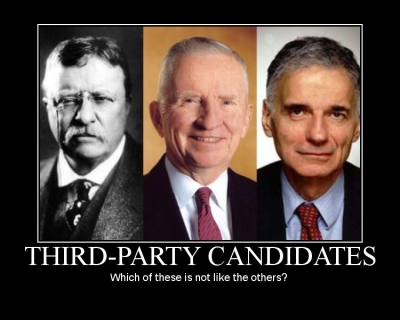Close window | View original article
Third Party Torment
Don't be seduced by third-party dreams.
The Washington Independent brings us this startling news:
For the first time since Gallup began polling the public on the issue, a majority of Republicans back the establishment of a third political party...
Gallup has the breakdown on its website, which includes the little-acknowledged fact that independents overwhelmingly want a third party and always have.
Is it finally time to give up on the Republicans and start over?
Playing a Rigged Game...
The problem is that, for two hundred years, our political institutions have been designed for two and only two parties. Our elections have a winner, a loser, and also-rans; there simply is no mechanism for a new entrant to get serious traction.
Not that it hasn't been tried; a review of American third parties could and does fill volumes. It isn't only kooks and extremists: sitting Presidents like Teddy Roosevelt have run on third-party platforms, to no avail. If established professionals with such wide name recognition couldn't make it work, who can?
Yet every now and again, we do change parties. America wasn't always Democrat and Republican; at one time, there were Democrats and Whigs. Before that, Democratic-Republicans and Federalists.
How did the changes take place? The Federalist party opposed the extremely popular War of 1812 and was so hammered at the polls that it ceased to be a national party. The Democratic-Republicans ruled alone briefly, but soon split into the Democrat and the Whig parties, thus giving us two again.
When the Civil War was about to take place, the Whigs couldn't decide whether they were pro- or anti-slavery. The party fragmented and was replaced by the vehemently anti-slavery Republican party that put Lincoln into office. The Democrats more or less supported slavery and then segregation for the next hundred years.
It's been those same two parties ever since. Every few decades, some wealthy or famous person decides to have a go as a third party candidate, Teddy Roosevelt and Ross Perot being merely the most notorious. All have had, on the surface, a plausible chance - yet all have suffered the same fate of ignominious defeat, usually dragging their preferred side down with them by splitting the vote.

...But A Dangerous One
There are two lessons we can learn from this brief tour of American partisan history:
1. It is possible to create a new American national political party and have it be successful.
2. To do that, you have to kill off one of the existing parties. Otherwise, you hand total power to your worst enemies.
The Tea Partiers are furious at the weakness of Republicans, and with good cause. There's also no shortage of leftists upset with Mr. Obama's failure to turn us into a Eurosclerotic aristocracy at the wave of his hand. Are either of these groups, though, in a position to actually destroy and replace the target of their frustration?
Consider what happened to the rump Federalists and rump Whigs: they had no national clout for several election rounds. The "Era of Good Feelings" after the end of the Federalists came about because there was only one national party, the Democratic-Republicans; ex-Federalists were disenfranchised entirely. This gave the ruling power a total monopoly on power - of course they'd feel good, and they also got to write the history books glorifying their accomplishments.
The same thing happened to the Whigs, with far worse consequences. The Democrats were having their own trouble with the slavery question, but managed to cooperate in electing James Buchanan as a compromise. It turned out Buchanan was such a compromiser by nature that he couldn't actually decide on anything; he fiddled while the country burned, and is generally considered one of our worst presidents. His strong leadership is best illustrated by his definitive view on slavery:
Buchanan's view of record was that secession was illegal, but that going to war to stop it was also illegal.
How's that for being decisive! Leading from behind is apparently an old tradition in American politics, but it doesn't get any better with age.
Abraham Lincoln actually had an opinion on the subject of slavery, and an even stronger one on the subject of the Union. His strongly-held principles saved the national bacon, but at an astronomically high cost.
As more and more observers are noting with fright, we are once again heading in the direction of a civil war. This is not a time for pusillanimous Republicans, but even more is it not a time for another Democrat.
Yes, the Republican Party urgently needs to find its long-missing principles, guts, and cojones. Conservatives need to push and shove on their leaders, demanding immediate action from those in power - not tomorrow, not next year, but now.
The Tea Party has had some success with this: for the first time in living memory, our Republican Congress is not merely talking about spending cuts but actually enacting them, albeit teensy ones. Hey, it's a start!
There is a time and a place for third parties: when you can win. In our system, it's simply not possible to win national office that way.
Instead, conservatives and Tea Partiers need to form a party within a party: organize, pressure, and agitate within the "big tent" of the Republican party, to push the Party and its officials all in the required conservative direction. Only that way is there a chance of stopping America's headlong dash off the cliff of bankruptcy, socialism, and in all probability, eventual totalitarianism of one form or another.
Replacing a rotten party is all well and good. It's much easier simply to commandeer the decaying shell, get it turned in the direction it must go, and make repairs from inside en route.